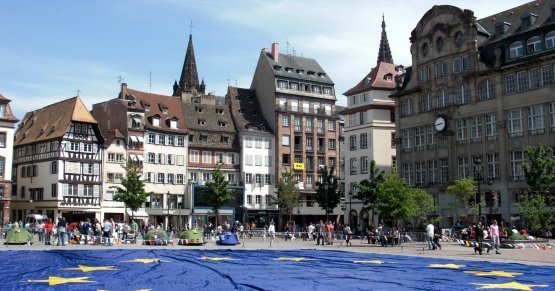Let’s talk about culture
During his speech at Paris-Sorbonne University on 26 September 2017, the French president Emmanuel Macron declared that “the strongest cement of the Union will always be culture and knowledge”, and proposed the creation of European universities and the broadening of exchange programs to secondary education and to professional training.
Of course, these proposals are encouraging and honourable. Indeed, while completing a higher education’s degree in another European country aside from an exchange program, the exercise remains quite tough since a real cooperation at the European level does not exist. In another country than the country of origin, most of social aids remain inaccessible since the nationality of the host country is a pre-condition. A general financial help from the EU does not exist either in this case. European universities could solve this deficiency, but would this be enough to establish a real “European cultural policy”?
Although the lack of a cultural policy at the European level is not new, I am personally surprised to notice that there is even not a Directorate-General dedicated to culture. [1] During his speech in Berlin in November 2004, José Manuel Barroso – new President of the European Commission at the time – declared: “We are entering a new, challenging, but also delicate, phase for Europe and for our Union. The questions of what Europe can do for culture, and what culture can do for Europe are not new. But in this context, they have acquired a new sense of urgency”. If culture is thus considered essential for the European cause at the highest level, the creation of a Directorate-General for culture, provided with an appropriate budget and a favourable legal framework should be a must.
Let’s do culture
While the stated goal is to promote a European brotherhood, and even the creation of a European identity, Brexit is here to remind that it is pointless to believe that economic and institutional reforms will achieve it. However, even if some texts call for a European cultural policy, how will it be structured since culture, unfortunately, remains a national prerogative?
Indeed, the Member States remain very attached to culture and are resistant to any loss of sovereignty in this field. Therefore, the European Union – and in particular the Directorate-General for Education, Youth, Sport and Culture – only has “a supporting competence” delimited by “a strict subsidiarity”.
The fervent wish of a real popular sense of belonging in the European institutions thus appears difficult, since a European identity (and consequently a European solidarity) cannot arise in the absence of a European cultural project. Although almost two thirds of German exports are going to other EU countries, German citizens tear each other apart on financial solidarity issues with Europe, whereas this same solidarity between Länder does not generate any debate, including in Bavaria. Sense of belonging and cultural identity are then a very powerful tool – just like the customs Union – when we wish to achieve a successful political and economic integration.
A subsidiary cultural policy for a secondary topic? Culture is the strongest cement of Europe, and cannot be satisfied with being provided with a ridiculous budget, only complementary and to the Member States’ cultural policies. Consequences are already deep and greatly slow down the European construction’s progress. This issue has to be raised as a fundamental need, because when financial crises divide people and increase inequalities, finding refuge in common values is witnessed and strengthen brotherhood links. And as Jean-Claude Juncker stated: “For me, Europe is more than just a single market. More than money, more than a currency, more than the euro. It was always about values.”




Follow the comments: |
|
